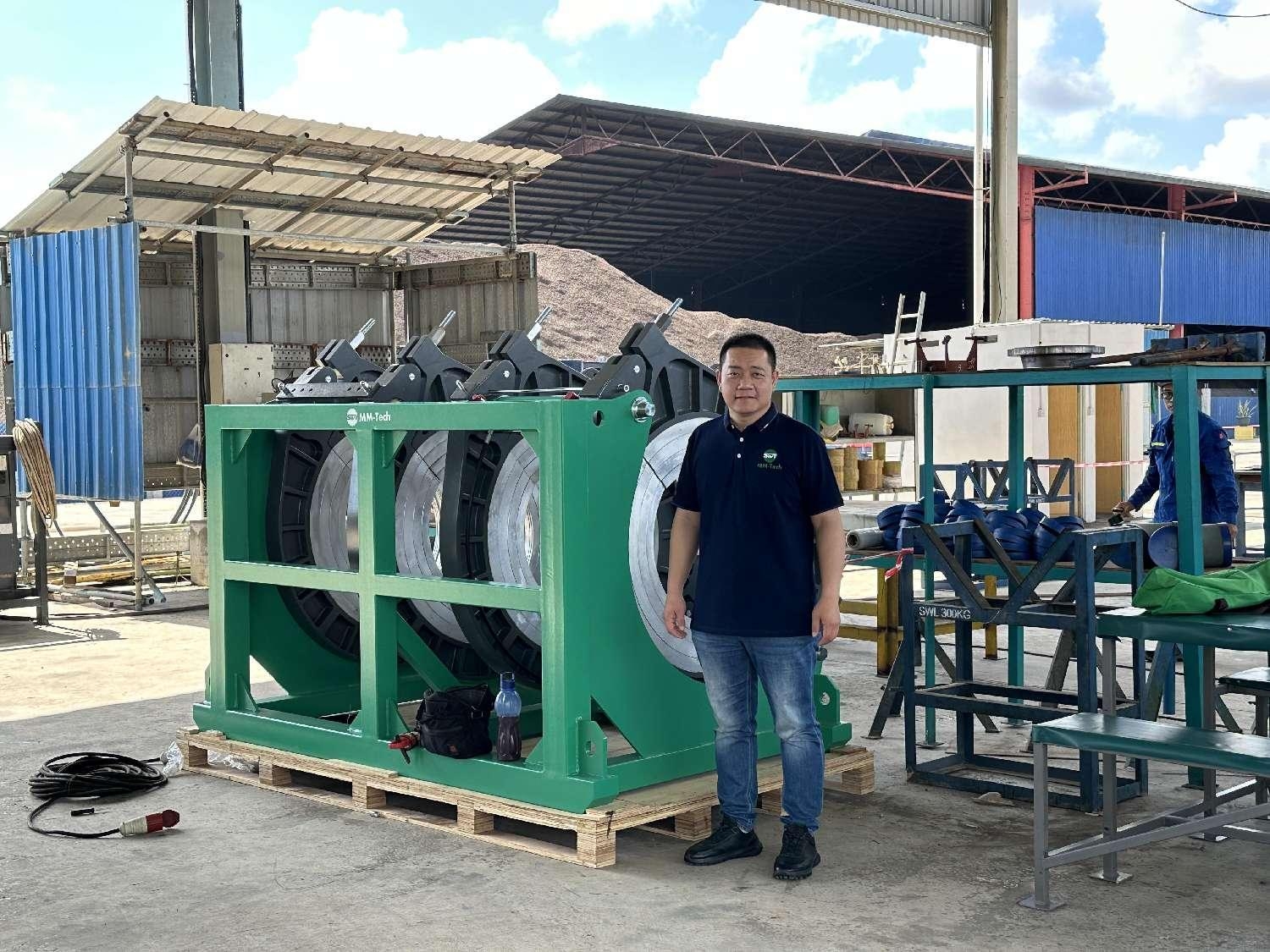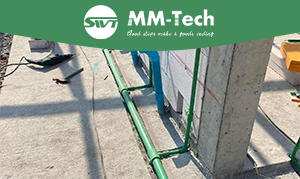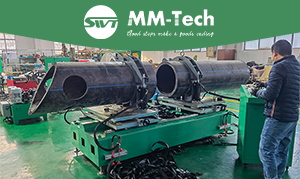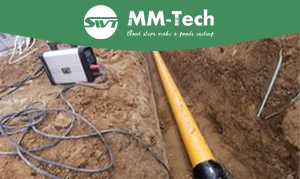Socket fusion machines have transformed how you join pipes in modern plumbing and construction. These machines ensure strong, leak-proof connections in thermoplastic piping systems, especially HDPE pipes. By using advanced technology, they improve welding precision and durability. A well-prepared site can reduce project delays by 20%, while proper fusion parameters can cut damage by 35%. This makes socket fusion machines indispensable for achieving efficiency and reliability in HDPE pipe welding.
Key Takeaways
Socket fusion machines make strong, leak-free connections for HDPE pipes.
These machines can cut project delays by 20% and damage by 35%.
Modern features like auto temperature control make joining more accurate.
The Basics of Socket Fusion and Its Efficiency
What Are Socket Fusion Machines?
Socket fusion machines are specialized tools designed for joining thermoplastic pipes, such as HDPE, through a precise fusion welding process. These machines heat both the pipe and fitting surfaces before pressing them together to create a seamless joint. This method ensures a strong bond, making it ideal for applications requiring durability and leak resistance.
Modern socket fusion machines, like MM-Tech‘s ppr welding machine, incorporate advanced features such as digital temperature control and automatic compensation. These features enhance the efficiency of the fusion welding process, ensuring consistent results. With their ability to handle various pipe sizes and materials, socket fusion machines are indispensable in plumbing, construction, and industrial applications.
How Socket Fusion Differs from Other Joining Methods
Socket fusion stands out from other pipe joining methods due to its simplicity and speed. Unlike butt fusion, which is better suited for larger pipes and high-pressure systems, socket fusion excels in small-diameter applications. It is particularly effective for pipes ranging from 1/2 inch to 2 inches in diameter.
Socket Fusion: Faster installation and ideal for residential plumbing or low-pressure systems.
Butt Fusion: Stronger connections for larger pipes and critical infrastructure.
Performance: Socket fusion offers quicker installation, while butt fusion provides superior leak resistance and longevity.
This versatility makes socket fusion a preferred choice for HDPE fusion welding in various settings.
Why Socket Fusion Is Ideal for HDPE Pipe Fusion Welding
Socket fusion is highly effective for HDPE pipe fusion welding due to its precision and reliability. The process involves heating the pipe and fitting separately before joining them under pressure. This creates a solid, leak-proof joint that withstands stress and environmental factors.
Key advantages of socket fusion for HDPE include:
Seamless fusion that minimizes leaks.
Compatibility with diverse pipe sizes and configurations.
High leak-tightness control, essential for water and gas systems.
By using socket fusion technology, you can achieve durable and efficient connections in HDPE piping systems, ensuring long-term performance.
Key Benefits of Socket Fusion Machines
Enhanced Speed and Productivity
Socket fusion machines significantly improve installation speed, making them ideal for HDPE pipe fusion welding projects. Their advanced heating mechanisms ensure quick preparation of pipe and fitting surfaces, reducing downtime during the welding process. You can complete tasks faster without compromising the quality of the joint.
Modern socket fusion machines, like MM-Tech’s ppr welding machine, offer features such as automatic temperature compensation and heating interval signal lights. These features streamline operations, allowing you to focus on achieving high-quality HDPE pipe welds. By using these machines, you can enhance productivity and meet tight project deadlines with ease.
Precision and Consistency in Pipe Joining
Socket fusion technology ensures successful and quality welds by delivering unmatched precision and consistency. The process involves heating the outside of the pipe and the inside of the fitting before joining them, creating a seamless connection. This method is particularly effective for smaller-diameter pipes, ensuring a precise fit every time.
Proper alignment and heating times are critical for achieving consistent results.
Off-site prefabrication allows better control over the fusion welding process.
Precise temperature adjustments ensure high-quality joints that meet industry standards.
By following best practices for reliable welds, you can achieve consistent and durable HDPE fusion joints, minimizing the risk of leaks or failures.
Durability and Leak-Proof Joints for HDPE Pipes
Socket fusion machines create joints that match the strength of the pipe itself, ensuring durability and leak-proof connections. The fusion process eliminates weak points, making the joints resistant to high pressures and extreme temperatures. This reliability is crucial for HDPE pipe fusion welding in water, gas, and chemical systems.
HDPE socket fusion fittings are known for their exceptional strength.
The fusion welding process prevents leaks and breakage under stress.
Research confirms the ability of these joints to withstand demanding conditions.
By using socket fusion machines, you can achieve high-quality HDPE pipe welds that deliver long-term performance and peace of mind.
Technological Advancements in Socket Fusion Machines
Automation and Smart Controls in MM-Tech’s ppr Welding Machine
Automation and smart controls have revolutionized socket fusion technology, making the fusion welding process more efficient and precise. MM-Tech’s ppr welding machine incorporates advanced automation features that reduce human input and improve accuracy. For instance, the integration of CAD and OLP systems allows you to extract necessary data seamlessly, enhancing efficiency in unique production environments. This automation reduces programming time by up to 80%, enabling faster project completion.
Smart controls, such as automatic temperature compensation, ensure consistent heating during the fusion process. These features minimize errors and improve the alignment of pipes and fittings, resulting in stronger joints. By using MM-Tech’s ppr welding machine, you can achieve high-quality results with minimal effort, making it an ideal choice for HDPE fusion applications.
Improved Heating Mechanisms for HDPE Fusion
Modern socket fusion machines feature enhanced heating mechanisms that ensure uniform heat distribution, a critical factor in achieving durable joints. Optimal preheat temperatures between 400 and 450 degrees Fahrenheit are maintained through automatic temperature control systems. These systems keep heating consistent within a narrow range, ensuring precise alignment and clamping during the fusion welding process.
To adapt to environmental conditions, insulated covers or shelters are often used to maintain optimal heating. Additionally, data logging tools monitor heat input and deviations, ensuring quality control throughout the process. These advancements in heating technology improve the reliability of HDPE fusion, making it a preferred method for creating leak-proof joints.
High-Quality Materials for Longevity and Efficiency
The use of high-quality materials in socket fusion machines enhances their durability and efficiency. Modern HDPE resins resist stress and tolerate heat, ensuring long-lasting performance. Fusion processes create joints that are often stronger than the pipe itself, providing reliability in demanding conditions. This strength reduces the need for frequent maintenance, saving you time and resources.
By following technical parameters during the fusion welding process, you can achieve robust and airtight joints. These joints require minimal servicing, contributing to the overall efficiency of the machine. MM-Tech’s commitment to using premium materials ensures that their machines deliver consistent performance, making them a valuable investment for professionals in HDPE fusion welding.
Practical Applications of Socket Fusion Machines
Plumbing and Water Distribution Systems
Socket fusion machines play a vital role in plumbing and water distribution systems. You can use them to create strong, leak-proof connections in residential and commercial buildings. Their ability to work efficiently in confined spaces makes them ideal for low-pressure systems like household plumbing. Faster installation times and precise alignment ensure that you can complete projects quickly without compromising quality.
Method | Advantages | Applications |
|---|---|---|
Socket Fusion | Faster installation, easier in confined spaces, strong connections | Residential plumbing, low-pressure systems |
Butt Fusion | More durable connections, suitable for larger pipes and high-pressure systems | Critical infrastructure, gas distribution, water supply |
Socket fusion technology ensures reliable joints for water supply systems, reducing the risk of leaks. This reliability is essential for maintaining consistent water flow in homes, offices, and public facilities.
Industrial and Commercial HDPE Pipe Fusion Welding
In industrial and commercial settings, socket fusion machines excel in HDPE pipe fusion welding. You can rely on them to join pipes used for transporting chemicals, fluids, and gases. Their precision and alignment capabilities ensure seamless joints, even in complex piping networks. This efficiency supports manufacturing facilities, hotels, shopping malls, and office complexes.
Sector | Application Description |
|---|---|
Plumbing | |
Utilities | Used for building and maintaining pipes for water, gas, and sewer systems, emphasizing reliability. |
Industrial | Employed in manufacturing facilities for transporting chemicals, fluids, and gases, supporting efficiency. |
Commercial | Utilized in hotels, shopping malls, and office complexes for high-standard plumbing installations. |
Residential | Integral in new construction and renovation projects, ensuring longevity and minimal maintenance for homes. |
By using socket fusion machines, you can achieve durable and efficient HDPE fusion joints, ensuring long-term performance in demanding environments.
Specialized Applications in Gas and Chemical Piping
Socket fusion machines also find specialized applications in gas and chemical piping. Their ability to create airtight joints makes them indispensable for these industries. You can use socket fusion ball valves in water treatment and chemical processing systems. These valves offer excellent sealing capabilities, ensuring safety and reliability.
Socket fusion ball valves are widely used in gas distribution systems due to their durability.
They resist pressure-induced corrosion, maintaining integrity in chemical handling operations.
Their reliability ensures safe and efficient transport of gases and chemicals.
These specialized applications highlight the versatility of socket fusion machines in handling critical piping tasks.
Socket fusion machines revolutionize pipe joining with their advanced technology and seamless fusion process. They create durable, leak-proof joints that withstand high pressures and extreme conditions. Their flexibility allows you to work with diverse pipe sizes and configurations. The table below highlights their key benefits:
Benefit | Description |
|---|---|
Joint Integrity | Creates solid, reliable joints through seamless fusion, minimizing leaks. |
Flexibility | Works with diverse sizes and configurations of HDPE pipes, enhancing design flexibility. |
Corrosion Resistance | Exhibits resistance against corrosion and chemical degradation, extending service life. |
Cost-Effectiveness | Initial costs are similar, but longevity and minimal maintenance lead to lower lifetime costs. |
Longevity | Can last over 50 years, qualifying as a sustainable and cost-effective alternative. |
By adopting this technology, you ensure efficient alignment, smoother fluid flow, and reduced maintenance. Socket fusion machines, like MM-Tech’s ppr welding machine, are indispensable for modern piping systems, offering reliability and long-term performance.
FAQ
What is the main advantage of using socket fusion machines?
Socket fusion machines create seamless, leak-proof joints. This ensures durability and reliability in thermoplastic piping systems, making them ideal for plumbing, construction, and industrial applications.
Can socket fusion machines handle different pipe sizes?
Yes, socket fusion machines work with various pipe diameters, typically ranging from 20mm to 40mm. This versatility makes them suitable for diverse projects.
How do socket fusion machines ensure joint quality?
They use precise heating and alignment techniques. This process guarantees strong, consistent joints that meet industry standards for durability and performance.



















